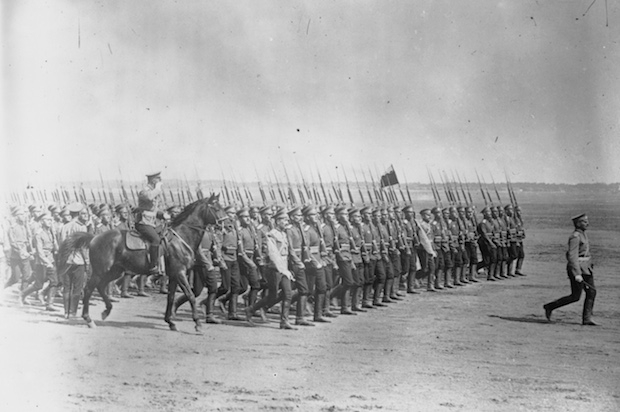From The Spectator, 24 October 1914:
For years past the vodka monopoly in Russia has been a public scandal. Government officials, in order to get good financial returns, have connived at the abasement of the people by encouraging drink. Year by year the revenue from the vodka monopoly has increased by leaps and bounds till the present year, when it was estimated to yield £93,000,000, or very nearly a third of the total revenue of the Russian Empire. Critics of Russia have long lugubriously prophesied that, in spite of all the Tsar’s protestations in favour of temper. ance, he would never venture to take any step which would impair such a magnificent revenue as this. He has not only promised steps; he has already taken them. On the outbreak of war the sale of liquor ceased absolutely, and obviously the revenue which the Government was deriving from the profits on the sales ceased also. The promise now made that the whole system shall be permanently abolished can be accepted with the more readiness because it has been based upon experience of valuable results. According to report, Russia, from being one of the most drunken countries in Europe, has at a stroke become one of the most temperate.
These are aspects of the Russian character which justify us in feeling immensely hopeful for the future. A man with a kindly heart will in the long run try to do the right thing ; a man who is bent on attaining his own ambitions regardless of the sufferings of other people is an enemy of the human race. That, we have now learned, is the broad contrast between the Slav and the Teuton. The Slays, of course, have their ambitions, but they are racial and national ambitions. They aspire to relieve themselves of foreign domination, whereas the Teutonic ambition is to bring other peoples under the domination of the Teuton. So far, therefore, as Europe is concerned, we are justified in believing that the advance of Russia means an advance of liberty. It has meant that in the Balkans, where Bulgaria and Serbia owe their independent existence very largely to Russian pressure upon Turkey. It will have the same meaning in Austria, where the war will certainly result in liberating a large number of Slave from Teutonic rule ; while further north we already see a new and freer Poland in course of creation. If these alone were the results of Russia’s struggle with Germany, we might well be satisfied with the advance in liberty secured through the action of what we have hitherto regarded as Russian despotism. But beyond this, there is abundant reason to hope that the war will have a regenerating influence upon the Government of Russia itself, and that the future will see a free Russia as well as an enlarged free Serbia and a free Poland.






Comments